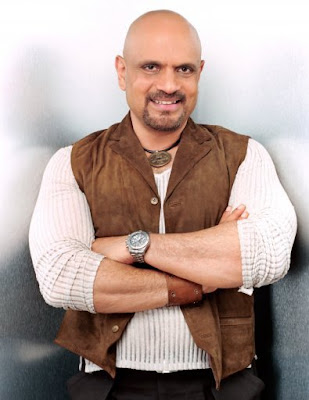Acclaimed theatre personality Bharat Dabholkar brings to you desi humour with his Blame it on Yashraj. He speaks about it, along with his newer play and directing a play of his style.
While English theatre thrives in Indian metro cities like Mumbai, it occasionally makes it appearance in Pune. An acclaimed English play, Blame it on Yashraj, had come to Pune a few months back. The director of the play is acclaimed theatre personality, actor and ad-filmmaker Bharat Dabholkar. One can give him the credit of bringing in Hinglish theatre. His humour is very Indian and touches one and all. Dabholkar speaks of writing and producing this unique play called Blame it on Yashraj and his work in general.
Would we call it the
very typical Bharat Dabholkar play like the previous ones?
Unlike other plays, Blame
it on Yashraj is about a wedding in a family. My other plays had mostly
Marathi cast and so the accent came in with it too. Here, the cast is
different. It is a different play though the basic style is the same. It is a
typically Indian play about people from different backgrounds coming together.
How did the concept
come up? Is it a typical rom-com? And why Blame
it on Yashraj?
 |
| Bharat Dabholkar |
It’s quite popular
amongst the masses. Was that expected?
Weddings are an integral part of our lives. Anything in this
play connects to your wedding. Since it is about a wedding which gets bigger,
it might remind one of the weddings one has seen. People feel as if watching a
scene from real life. It is like a reflection from your life. After watching
it, people have actually come to me saying that this is exactly how it happened
in their life. This is what finally works for everyone.
I was intrigued by
the casting, especially of Ananth Mahadevan and Jayati Bhatia.
I have known Ananth for years. But I have worked with Jayati
for the first time. The interesting thing is she is a Bengali married to a
Punjabi. When she came for the audition, I didn’t know that. But she had the
perfect accent and then she revealed her connection.
You have been low-key
lately. Intentional?
I did a small play called Talk to Me, Aishwarya. I also did Purush in English. After a long time, I came up with this present
play. Now, I have come up with a newer version of Bottom’s Up with newer topics.
You are known for
your Indian style of humour. Presently, do you feel we still have that humour?
The thing is different kind of things are happening.
Youngsters are coming to theatre. Like in Bottom’s
Up, I will be having stand-up comedy by actors. Stand-up comedy is about
making fun of things around like politics, etc, which is what the play is
about. Youngsters these days are also seeing stand-up comedy and are connecting
with it. On social media, people are taking on other people. Youngsters relate
to it. Frankly, things have not changed a lot while making fun of politicians. You
still have the same old people to laugh at.
Anyone who is your
favourite at the moment?
I don’t see much of
theatre these days. But I have seen Vir Das’s show a couple of times and he is
one of the best.
Have you given film
direction any thought? As a Maharashtrian, why not make a film in Marathi?
A lot of people have approached me. But I am taking it easy.
Work for Bottom’s Up is on. After
that, maybe I will think. People are already doing great work in Marathi. I
will do a film in Hindi.
Photo Credit: http://dogsandpupsmagazine.com/
